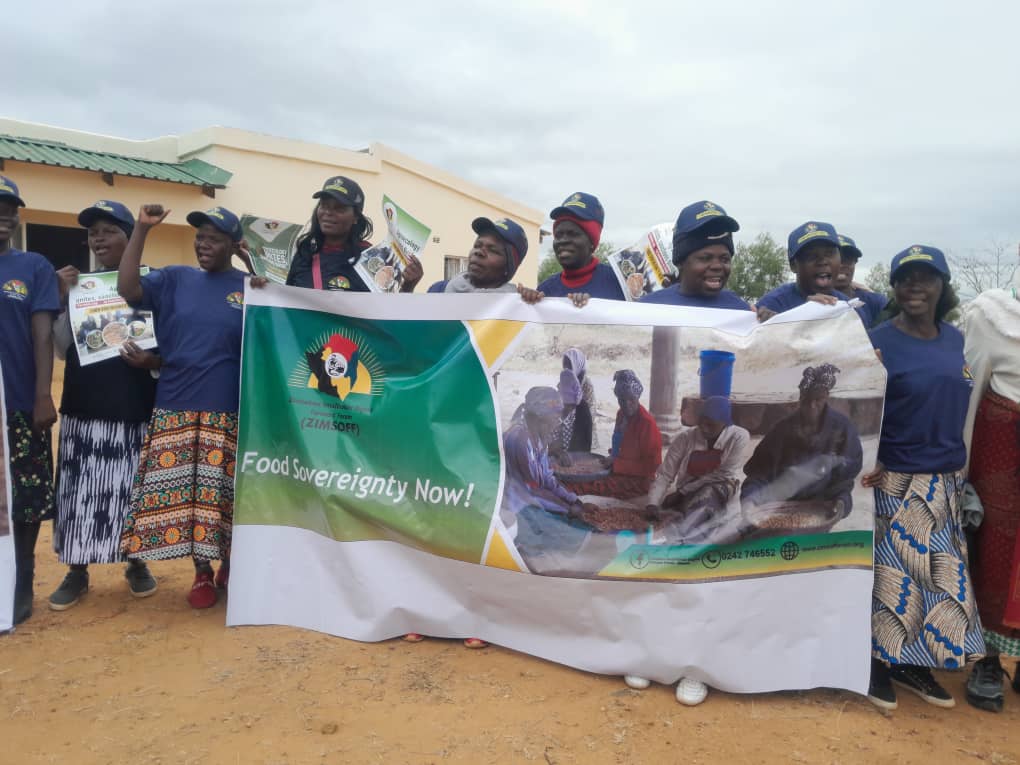|
Getting your Trinity Audio player ready...
|
Writes Lloyd Rabaya
With the sharp voices of the Zvamahande Primary School pupils cutting through the air echoing the food sovereignty message with their poems, the farmers from various provinces who were gathered at Shashe Agroecology School celebrating the International Day of Rural Women, which was preceded by International Food Sovereignty Day, lauded and ululated in awe.
According to the United Nations (UN) Food and Agriculture Organization (FAO), women manage 60% of smallholder farms and produce approximately 70% of Zimbabwe’s food. Women also constitute 60-80% of the labour force.
On top of child care and household chores, women’s roles extend beyond food production but are also involved in processing, preservation, selling, and household food management.
“Since time immemorial, women have been looked down upon even though they carry the burden of carrying pregnancy, ensuring that everyone has eaten, child care, and working in the field. But the woman has been overlooked, “said Ms Elizabeth Mpofu, Coordinator for African Women Collaborative Healthy Food Systems and Zimbabwe Smallholder Organic Farmers Forum (ZIMSOFF) member farmer.
Despite their contributions, women usually face various challenges that stem from the patriarchal nature of Zimbabwean society, which suppresses women in households and usually exposes them to social ills like Gender-Based violence (GBV). To evade this, most rural women ventured into smallholder farming to sustain and empower themselves.
“We jointly celebrate International Rural Women’s Day with Food Sovereignty Day because we realised they work hand-in-glove. We are the women that farm, keep seeds, and know good and healthy food for our families,” she said.
Diana Setse, an agroecological farmer and cancer survivor from Nyanga, dovetailed with Ms Mpofu and highlighted that the traditional seeds and foods not only empower them but also provide a healthy and nutritious diet.
“When I was diagnosed with cancer, the doctors told me to eat more small grains. With small grains, you do not get any ailment, unlike the larger grains, which we use synthetic fertilizers on,” she said.
Due to the high recommendation of consumption of small grains from health practitioners, Setse and other farmers can now have some extra income from selling. Since agroecology requires a shoestring budget and labour, Setse does not incur any losses even with very little rain.
“Crops like mhunga, mapfunde, zviyo do not need any synthetic fertilizers. We only use what we have, that is, organic manure from our livestock. It is cheap,” she said.
Even though drought was declared a state of national disaster this year, Setse and other farmers are food secure.
“Small grains do not require much rain, and we, the farmers, are our seed custodians. This year, we are food sufficient because we managed to harvest enough for the family,” she added.
Janet Simbini from Checheche in Chipinge, also highlighted that many in her area have developed a keen interest in joining the agroecology way of farming as they have witnessed Simbini’s family food sufficient even when they have received little rain. On top of that, they do not fork out much to produce their highly nutritious food.
“Small grains, even when rain falls two or three times, can mature well. The biggest advantage is that on a small piece of land, one can have all the nutrients as we will be practicing intercropping, mixed farming, and crop rotation. These methods also ensure that the soil stays healthy,” she said.
Agroecology does not only provide these farmers with food but is also vital for medicinal purposes that, according to Simbini, do not have any side effects.
“For example, if you are told that the blood level is low, you can use blackjack, and zviyo are good for the general health of the body. They keep the bones strong,” Simbini added.
ZIMSOFF Programs Officer, Patience Shumba, reiterated the need for supporting rural women and suggested that supporting them in all ways possible is key to driving the Zimbabwean economy.
“Women have limited access to agricultural resources, extension services, and technologies. Whereas agroecology emphasizes low-input farming practices and aligns well with their existing methods. Supporting them in agroecological practices can lead to more sustainable farming methods that are both economically viable and environmentally friendly,” she said.
However, despite efforts to better their lives with farming, farmers have bemoaned a derailing force – sanctions.
“Sanctions have been making it difficult to reach our full potential as farmers because we have been failing to reach some international markets due to set restrictions,” bemoaned Mpofu, with a strong voice.
Mpofu also strongly suggested that farmers should speak with one voice to fight against the sanctions as the ordinary smallholder farmer is most affected.
”
We should not say the fight against sanctions is for the government when we are the government. If we do not rise and fight as Zimbabwean farmers, no one else will,” she added.
We should not say the fight against sanctions is for the government when we are the government. If we do not rise and fight as Zimbabwean farmers, no one else will,” she added.






